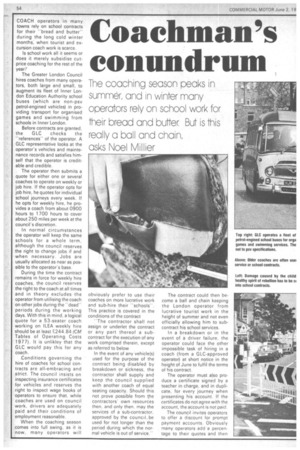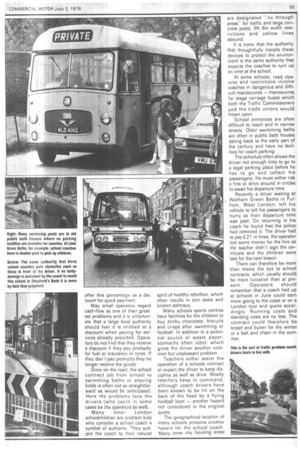Coachman's conundrum
Page 56

Page 57

If you've noticed an error in this article please click here to report it so we can fix it.
COACH operators in many towns rely on school contracts for their "bread arid butter" during the long cold winter months", when tourist and excursion coach work is scarce.
Is school work all it seems or does it merely subsidise cutprice coaching for the rest of the year' The Greater London Council hires coaches from many operators, both large and small, to augment its fleet of Inner London Education Authority school buses (which are non-psv petrol-engined vehicles) in providing transport for organised games and swimming from schools in Inner London.
Before contracts are granted, the GLC checks the "referencesof the operator. A GLC representative looks at the operator's vehicles and maintenance records and satisfies himself that the operator is creditable and credible.
The operator then submits a quote for either one or several coaches to operate on weekly or job hire. If the operator opts for job hire, he quotes for individual school journeys every week. If he opts for weekly hire, he provides a coach from about 0900 hours to 1700 hours to cover about 250 miles per week at the council's discretion, In normal circumstances the operator will keep the same schools for a whole term, although the council reserves the right to change jobs if and when necessary. Jobs are usually allocated as near as possible to the operator's base.
During the time the contract remains in force for weekly hire coaches, the council reserves the right to the coach at all times and in theory excludes•the operator from utilising the coach on other jobs during the "dead" periods during the working days. With this in mind, a logical quote for a 53-seater coach working on ILEA weekly hire should be at least £244.84 (CM Tables of Operating Costs 1977). it is unlikley that the GLC would pay this for any coach.
Conditions governing the hire of coaches for school contracts are all-embracing and strict. The council insists on inspecting insurance certificates for vehicles and reserves the right to inspect wage books of operators to ensure that, while coaches are used on council work, drivers are adequately paid and their conditions of employment reasonable.
When the coaching season comes into full swing, as it is now, many operators will obviously prefer to use their coaches on more lucrative work and sub-hire their "schools". This practice is covered in the conditions of the contract "The contractor shall not assign or underlet the contract or any part thereof a subcontract for the execution of any work comprised therein, except as referred to below
In the event of any vehicle(s) used for the purpose of the contract being disabled by breakdown or sickness, the contractor shall supply and keep the council supplied with another coach of equal seating capacity. Should this not prove possible from he contractors' own resources then, and only then. may the services of a sub-contractor, approved by the council, be used for not longer than the period during which the normal vehicle is out of service.
The contract could then become a ball and chain keeping the London operator from lucrative tourist work in the height of summer and not even officially allowing him to subcontract his school services.
In a breakdown or in the event of a driver failure, the operator could face the other impossible task of hiring in a coach (from a G LC-approved operator) at short notice in the height of June to fulfil the terms of his contract.
The operator must also produce a certificate signed by a teacher in charge, and in duplicate, for every journey when presenting his account. If the certificates do not agree with the account, the account is not paid.
The council invites operators to offer a discount for prompt payment accounts. Obviously many operators add a percentage to their quotes and then offer this percentage as a discount for quick payment.
May small operators regard cash-flow as one of their greatest problems and it is unfortunate that a large local authority should feel it is entitled to a discount when paying for services already provided. Operators do not find that they receive a discount if they pay promptly for fuel or insurance or tyres. If they don't pay promptly they no longer receive the goods.
Once on the road, the school contract job from school to swimming baths or playing fields is often not as straightforward as would be anticipated. Here the problems face the drivers (who could in some cases be the operators as well).
Many Inner London schoolchildren are problem kids who consider a school coach a symbol of authority. They subject the coach to their natural spirit of healthy rebellion, which often results in torn seats and broken ashtrays.
Many schools sports centres have facilities for the children to buy sticky chocolate, biscuits and crisps after swimming or football. In addition to a potential source of waste paper, stomachs often rebel, which gives the driver another common but unpleasant problem.
Teachers either assist the operation of a schools contract or expect the driver to keep discipline as well as drive. Mostly teachers keep in command, although coach drivers have been known to be hit on the back of the head by a flying football boot — another hazard not considered in the original quote.
The geographical location of many schools presents another hazard for the school coach. Many inner city housing areas are designated "no through' areas" for traffic and large con-. crete posts, 6ft Sin width restrictions and yellow lines. abound.
It is ironic that the authority that thoughtfully installs these devices to protect the environment is the same authority that expects the coaches to turn up on time at the school.
At some schools, road closures and restrictions involve coaches in dangerous and difficult manoeuvres — manoeuvres for stage carriage buses which both the Traffic Commissioners and the trade unions would frown upon.
School entrances are often difficult to reach and in narrow streets. Older swimming baths are often in public bath houses dating back to the early part of the century and have no facilities for coach parking.
The schedule often allows the driver not enough time to go to a legal parking place before he has to go and collect his passengers. He must either risk a fine or drive around in circles to await his departure time.
Recently a driver waiting at Walham Green Baths in Fulham, West London, left his vehicle to tell his passengers to hurry as their departure time was past. On returning to his coach he found that the police had removed it. The driver had to pay £21 in fines, the operator lost some money for the hire as the teacher didn't sign the certificate and the children were late for the next lesson.
There can therefore be more than meets the eye to school contracts, which usually should be more lucrative than at pre sent. Operators should remember that a coach tied up at schools in June could earn more going to the coast or on a London tour and quote accordingly. Running costs and standing costs are no less. The contract could therefore be bread and butter for the winter or a ball and chain in the summer.








































































































































